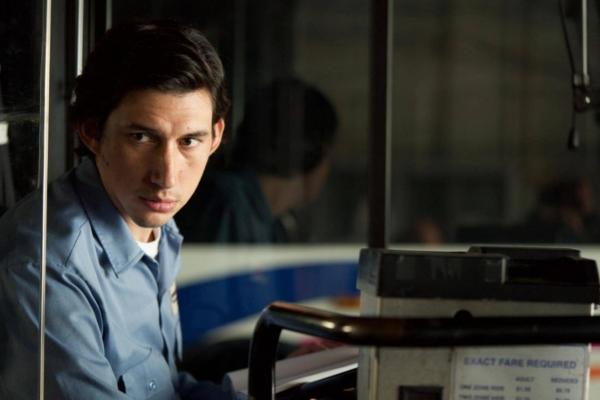THERE'S A crazy-beautiful idea in Paterson, Jim Jarmusch’s film about a bus-driving New Jersey poet (or a poetry-writing bus driver), that makes it honestly inspirational, and perhaps even holy. Inspirational because this story of an ordinary guy in an ordinary town shows us how to see our own ordinariness as full of wonder; holy because this ordinary guy is an icon of integrity—he loves, he lets his yes be yes, and judgmentalism finds no foothold in him.
The crazy-beautiful idea is that everyone is an artist, and that when not subjected to the trappings of academia, the publishing industry, or commerce, creativity can just flow as part of everyday life. Adam Driver is perfectly ordinary enough to be a gift in the lead role (Paterson his name, Paterson his town), containing his tall muscular frame with gentleness, but ready to use it to protect (a military past is invoked through the subtle use of an old photograph). The Iranian actor Golshifteh Farahani brings a lovely, mild eccentricity to the woman he loves. Their kindness and dreaming together makes a blue-collar house a palace.
Paterson unfolds over a week, and I do mean unfolds—the day-by-day account replays the moments that repeat themselves in most of our lives (waking up, the commute, encounters with others, the walk home, dinner, and a beer at the local pub). Each day’s experience reveals more about the people we’re watching.
Someone has called Paterson a “utopian” film, and although it would be easy to read only the surface and see a pleasant tale of a guy and a girl and the music of words, it earns that term. For one thing, the community in Paterson is one of the most racially diverse in movies—there are distinct African-American, Indian-American, and Middle Eastern voices here. The average white guy is in the minority—and utterly satisfied with his life. Not only is he not striving for the public acclaim usually featured in stories of struggling artists, he is so mindful about the world and his place in it that he may not even notice that his poetry isn’t winning him any awards (never mind income).
He also may not notice, nor does the film remark upon, the most idyllic fact of his life: In a movie set 40 minutes from Manhattan, in an era where louder voices are telling us to fear the other, home is a white U.S. veteran and a brown-skinned Middle Eastern free spirit, figuring life out together. Another crazy-beautiful idea. Or maybe not so crazy.

Got something to say about what you're reading? We value your feedback!

